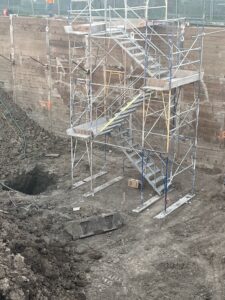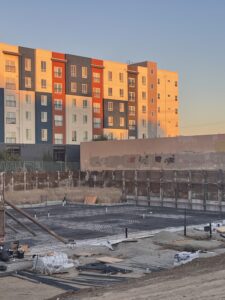Waterproofing positively impacts commercial and residential construction projects. Professionals must properly seal surfaces so that moisture can not get in, but for moisture inside to find its exit. Waterproofing protects infrastructure, saves energy, ensures safety, and prevents damage.
 Protecting Infrastructure
Protecting Infrastructure
One of the primary reasons waterproofing is vital in construction projects is to protect infrastructure. Water infiltration significantly weakens structures over time, leading to structural instability, decay, and the need for costly repairs. Specialists can apply waterproofing techniques during construction to create a barrier preventing water from seeping into buildings’ foundations, walls, and roofs. Below grade waterproofing applies to subterranean projects such as basements. This type of waterproofing uses retaining walls or post applied shotcrete as a method to protect infrastructures.
Saving Energy
Waterproofing also plays a crucial role in saving energy within buildings. When water infiltrates a structure it causes dampness issues such as mold and mildew. These conditions create an unhealthy environment and can lead to respiratory problems for occupants. Additionally, dampness can affect the insulation properties of a building, resulting in an increase in energy consumption for heating and cooling purposes. By waterproofing construction projects, energy efficiency is improved, leading to lower energy bills plus a more sustainable built environment.
Ensuring Safety
When water seeps into electrical systems, it can cause short circuits and electrical fires. Additionally, excessive moisture can weaken structural elements, leading to collapses and accidents. Waterproofing construction projects ensures the safety of occupants by preventing such hazards. It also minimizes the risk of falling accidents caused by wet surfaces, creating a safer environment for everyone.
 Preventing Damage
Preventing Damage
Water damage is one of the most common and destructive issues faced by infrastructure. It leads to the deterioration of materials, including wood rot, corrosion of metal components, and degradation of concrete structures. Waterproofing construction projects prevents water from penetrating the building envelope, thus safeguarding the integrity of materials. By eliminating the potential for water damage, the need for expensive repairs and replacements is significantly reduced, further saving both time and money.
Waterproofing construction projects is of utmost importance for multiple reasons. It protects infrastructure by preventing water infiltration, ensuring the durability and longevity of buildings. Additionally, it saves energy by improving insulation properties and reducing risk of mold or mildew growth. Waterproofing also ensures the safety of occupants by preventing electrical hazards and structural instability. Lastly, it prevents water damage, minimizing the need for costly repairs and replacements. Therefore, investing in waterproofing during construction is a wise decision that not only enhances the quality of buildings but also contributes to the sustainability and longevity of our built environment.
